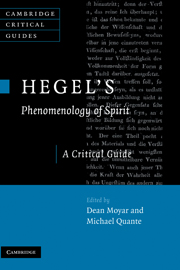Book contents
- Frontmatter
- Contents
- Notes on the contributors
- Preface
- List of abbreviations and citations
- Chapter 1 Substance, subject, system: the justification of science in Hegel's Phenomenology of Spirit
- Chapter 2 “Science of the phenomenology of spirit”: Hegel's program and its implementation
- Chapter 3 The Phenomenology of Spirit as a “transcendentalistic” argument for a monistic ontology
- Chapter 4 Sense-certainty and the “this-such”
- Chapter 5 From desire to recognition: Hegel's account of human sociality
- Chapter 6 “Reason … apprehended irrationally”: Hegel's critique of Observing Reason
- Chapter 7 What is a “shape of spirit”?
- Chapter 8 Ethical life, morality, and the role of spirit in the Phenomenology of Spirit
- Chapter 9 Self-completing alienation: Hegel's argument for transparent conditions of free agency
- Chapter 10 Practical reason and spirit in Hegel's Phenomenology of spirit
- Chapter 11 Religion and demythologization in Hegel's Phenomenology of Spirit
- Chapter 12 The “logic of experience” as “absolute knowledge” in Hegel's Phenomenology of Spirit
- Bibliography
- Index
Chapter 4 - Sense-certainty and the “this-such”
Published online by Cambridge University Press: 22 September 2009
- Frontmatter
- Contents
- Notes on the contributors
- Preface
- List of abbreviations and citations
- Chapter 1 Substance, subject, system: the justification of science in Hegel's Phenomenology of Spirit
- Chapter 2 “Science of the phenomenology of spirit”: Hegel's program and its implementation
- Chapter 3 The Phenomenology of Spirit as a “transcendentalistic” argument for a monistic ontology
- Chapter 4 Sense-certainty and the “this-such”
- Chapter 5 From desire to recognition: Hegel's account of human sociality
- Chapter 6 “Reason … apprehended irrationally”: Hegel's critique of Observing Reason
- Chapter 7 What is a “shape of spirit”?
- Chapter 8 Ethical life, morality, and the role of spirit in the Phenomenology of Spirit
- Chapter 9 Self-completing alienation: Hegel's argument for transparent conditions of free agency
- Chapter 10 Practical reason and spirit in Hegel's Phenomenology of spirit
- Chapter 11 Religion and demythologization in Hegel's Phenomenology of Spirit
- Chapter 12 The “logic of experience” as “absolute knowledge” in Hegel's Phenomenology of Spirit
- Bibliography
- Index
Summary
Hegel's Phenomenology of Spirit is knowledge's voyage of self-discovery. It begins with the mere appearance of knowledge – that is, what knowledge at first seems to be. But what knowledge at first seems to be is not congruent with its reality, even in its first appearance. The incongruence creates an instability that pushes knowledge on to other ways to take itself, stopping only when a conception of knowledge has been developed on which knowledge seems to be exactly what it is. My concern here is an examination of one of the opening arguments in the “Sense-Certainty” chapter of the Phenomenology, showing how the moves Hegel tracks in the “Sense-Certainty” chapter provide an important supplement to the analysis of perceptual knowledge provided by Wilfrid Sellars (1967).
To begin the story of knowledge's self-discovery, we need to be able to fix the beginning point: How does knowledge first appear? Hegel's answer assumes – an assumption to be justified in the course of his story – that knowledge is some form of relatedness between mind and world, and then asserts that knowledge first appears as an immediate and simple relation between mind and world. Given the direction of fit implicit in our pretheoretic concept of knowledge, this seems to require that the object must be simply what is and the subject must be receptive, the knowledge neither transforming the object nor adding anything new or additional.
- Type
- Chapter
- Information
- Hegel's Phenomenology of SpiritA Critical Guide, pp. 63 - 75Publisher: Cambridge University PressPrint publication year: 2008
- 6
- Cited by



